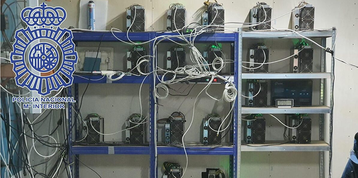Spain's national police raided a building that they thought was being used to grow marijuana, only to find out that it was an illegal cryptocurrency mining operation.
The makeshift data center was being used to mine Bitcoin, using public electricity. The electricity fraud was thought to amount to around €2,000 ($2,250) a month.
The facility, in the town of Santiponce, Seville, had more than €50,000 ($56,000) of mining equipment, including 21 ASIC systems and other Bitcoin rigs.
Police believe that the site had only recently begun operations. They estimated that, at current Bitcoin valuations, it would have generated around €3,500 ($3,900) in profit a month.
It is believed that the people behind the illegal data center did not have time to turn a profit on the site.
After initial set up costs, cryptocurrency miners make a profit based on the difference between the valuation of their virtual currency of choice and the price of the electricity used to mine it.
This has caused many to open up shop in places with extremely low electricity prices - which has caused problems, exacerbating political tensions in Abkhazia, and leading to fossil fuel plants being reopened.
But, for some, the prices still are not cheap enough, leading to a rash of illegal operations springing up the world over, siphoning off public power for free.
This is similar to what underground cannabis farms do, causing confusion for police forces that search for high power draw and large heat signatures.
Last May, police in the UK raided a site on the outskirts of Birmingham they believed was growing forbidden plants.
“It’s certainly not what we were expecting,” Jennifer Griffin, Sandwell police sergeant, said in a statement at the time. “It had all the hallmarks of a cannabis cultivation set-up and I believe it’s only the second such crypto mine we’ve encountered in the West Midlands.”
With more legitimate data centers and cannabis farms, there is also overlap: The two industries are set to find themselves increasingly competing for the same land, power, and water.




